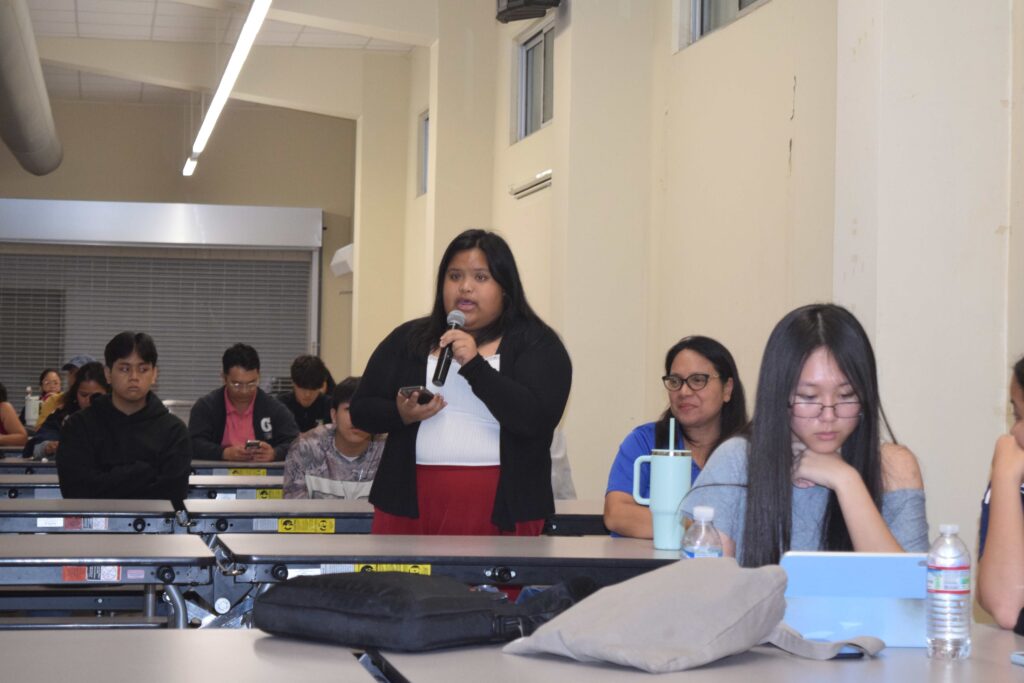
Marianas High School senior student Ainsley Ancheta asks a question during the Public School System’s town hall meeting in the MHS cafeteria on Wednesday.
Photo by Emmanuel T. Erediano
THE cafeteria at Chacha Ocean View Middle School was abuzz Tuesday night, not with the chatter of students but with the voices of parents, teachers and community members gathering for the first Public School System budget town hall. Close to 100 attendees filled the room, and over 100 others tuned in virtually, to learn what the looming budget reduction might mean for their children’s education.
A day later, on Wednesday night, the crowd in Marianas High School’s cafeteria for the central school cluster meeting nearly tripled, with close to 300 parents and stakeholders joining in person and online to see Education Commissioner Dr. Lawrence F. Camacho’s presentation on the implications of a budget cut on public education.
“We have to prepare for worst-case scenarios to meet the budget being earmarked for PSS,” Camacho told the crowd. “With all these cost-cutting measures, this could become a reality by Oct. 1. These aren’t just possibilities — they are realities we must consider.”
Camacho said federal grants cannot be used to cover local funding shortfalls. “These grants are for specific purposes that support student learning. We will have trouble with the federal government if we divert them to cover local budget gaps,” he said.
“We have to make it fair to all — across the board. All 1,200 of us will have to make tough choices if PSS’s [budget] proposal is not approved,” he added.
The Senate is scheduled to hear the PSS budget proposal on Sept. 9.
Questions and concerns
Following Camacho’s presentation, parents, students and educators raised their hands to have the opportunity to voice their concerns.
One teacher asked: “Why not sue the government for failing to meet the constitutional mandate of 25% for education?”
James, a grandfather, urged PSS to explore alternative funding. “Check with legal counsel to see if we can apply for grants from wealthy individuals or nonprofits. Let PTSAs lead fundraising instead of doing nothing. Hold a Monday fundraiser while schools are off.”
A mother warned against reducing instructional days from 180 to 150. “Cutting 30 days forces the government’s hand into an emergency. Spread out the instructional days instead,” she said.
A father questioned why schools were being singled out. “PSS seems to be the only agency facing cuts. Are there others? Why only PSS?”
One student asked, “What will happen if our days are cut by 30?”
Another student added: “Thirty days is a whole month without learning. What will we do?”
A special education teacher said: “What about students who require one-on-one learning? They will lose this opportunity.”
Proposed cuts
Camacho outlined possible cost-saving measures if the Legislature does not restore funding. These include freezing certification and licensure adjustments, reducing energy use, eliminating the budget for major repairs, and cutting employee work schedules to 64 hours per pay period — a 20% reduction in both hours and pay. Other measures could include slashing school and central office budgets, and furloughing administrators, substitutes, vice principals, support staff, and teachers or counselors not considered highly qualified.
Many parents and teachers expressed support for public education, acknowledged revenue shortfalls affect all agencies but insisted that education remain a priority.
Rep. TJ Manglona, who attended the northern cluster meeting both as a lawmaker and a parent leader, said families are ready to stand with PSS but want leaders to protect classroom learning first.
Several parents echoed that sentiment, offering solutions ranging from fundraising and nonprofit partnerships to spreading out instructional days to avoid deep cuts.
The attendees sounded a mix of frustration and resolve about what Oct. 1 may bring, expressing a determination that schools and families would not face it alone.
As one parent put it before leaving the MHS cafeteria: “We understand the economy is tough, but our children’s education has to come first. We will work with PSS, but the government must work with us too.”
The commissioner said more town halls are planned for the southern school clusters in the coming weeks, as PSS gathers community feedback before finalizing its budget strategy.
For now, the message from families, educators, and students is while they brace for tough choices, they will defend the future of public education.











